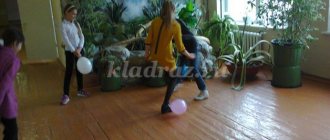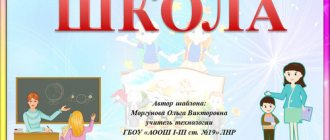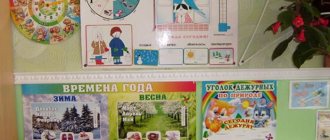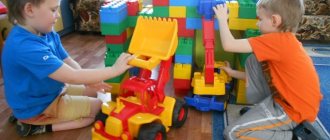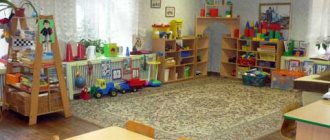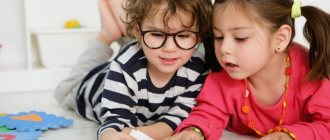Guidelines
Includes sections:
- Programs. Educational, working, variative, additional education
- Teachers' councils
- Speech therapy. To help speech therapists
- Projects. Project activities in kindergarten
- Physical education of preschool children. Sport
- Music and choreography. Musical development of preschool children, materials for music directors
- Circle work. Additional education
- ISO. Visual activities in kindergarten
- Working with parents
- Psychology of preschoolers
- Continuity between kindergarten and school. Interaction between the preschool educational institution and the school
- GKP. Short stay groups
- Individual educational route for a child. IOM
- Federal State Educational Standard. Implementation and implementation
- Characteristics of a child in kindergarten
- Introspection
- Surprise moment
- Competition regulations. Samples of regulations on holding competitive events in preschool educational institutions
- Certification
- Consultations for educators
- Trainings for teachers and educators
- Master classes for educators and teachers
- Defectology. Materials for defectologists
- Holiday scenarios. Entertainment, leisure, matinees
- Planning. Work plans
By groups:
- Senior group
- Preparatory group
- Middle group
- Junior group
Showing publications 1-10 of 38178. All sections | Methodological recommendations and developments
New
Photo
The best
Analytical report of an early childhood teacher for the 2019–2020 academic year Analytical report. There are 34 pupils in the early age group: 14 boys, 20 girls. Children's age is from 2 to 3 years. Over the course of the year, the children developed, mastered the program material and showed positive dynamics in all areas of development. The children's adaptation was successful...
Analytical report of a junior group teacher on work for the 2018-2019 academic year Analytical report of a junior group teacher on work for the 2018-2019 academic year. Educators: Group composition: total children -36; boys – 17; girls - 19. The age of the children at the beginning of the year was 4 years. During the year, the children developed according to their age, studied program material and...
2018-2019 academic year
Meeting of the city educational and methodological group of senior educators and music directors of preschool educational institutions of the city. Samara “Creative laboratory for playing folk instruments, dancing and games”
On April 18, 2020, a meeting of the city educational and methodological group of senior educators and music directors of the preschool educational institution was held at the preschool educational institution. Samara. The music director of the kindergarten, Olga Ilyinichna Fomina, shared her experience of working with colleagues - she conducted a master class for teachers “Traditional folk dance as a means of introducing preschool children to folk culture”
Program of the meeting of the city educational and methodological group of senior educators and music directors of preschool educational institutions of the city. Samara “Creative laboratory for playing folk instruments, dancing and games”
City Forum of Educational Initiatives
On April 11, 2020, the Forum of educational initiatives “Projects and initiatives in preschool education of the Samara urban district: effective practices” was held in the city of Samara. As part of this forum, the head of MBDOU "Kindergarten No. 365" Mr. Samara Gridneva Elena Vyacheslavovna shared with her colleagues her experience of working on the topic “Development of speech activity of preschool children based on the implementation of the author’s program “Learning to Tell”
Order and program of the forum
Regional methodological week “Implementation of the activity approach in the practice of preschool teachers”
- Methodological week program
- Assessment sheet for GCD with children
- Methodological recommendations for organizing and conducting a master class
GCD in the second junior group on the topic “Forest Walk”
GCD map in a preparatory school group on the topic “Sounds n, n. Letters N, n"
GCD map in a speech therapy group preparatory to school on the topic “Let's talk about spring”
Summary of GCD in the senior speech therapy group on the topic “Family”!
Methodological materials based on the results of lesson No. 2 of the city School of Young Teachers
Organization and methodology of walking in kindergarten
Message "Teremka Voskobovich"
The message “Games V.V. Voskobovich"
The message “The history of the emergence of V. Voskobovich’s technique. Playbook “Carpet Casket”
Task for Igrovisor Voskobovich
Photos of courses
Methodological recommendations and developments - Pedagogical council on the topic “Ecology in kindergarten”
Publication “Pedagogical council on the topic “Ecology in kindergarten...” Pedagogical council on the topic “Ecology in kindergarten” Goal: Improving work in kindergarten to form the foundations of environmental culture in preschoolers. Agenda: 1. Opening remarks. a) “What do we know about ecology”, discussion of issues. 2. Message on the topic:…
Image library "MAAM-pictures"
Pedagogical Council “Organization of school work to promote a healthy lifestyle and strengthen the health of students” Pedagogical Council. Topic: Healthy children - healthy future. GOAL: to determine the possibilities, conditions and main directions for improving pedagogical activities to create a healthy lifestyle for students. Agenda. 1. “Organization of school work to form...
Educational work for educators “Etiquette in the professional culture of a teacher”
Form of the event: business notebook. Etiquette is not just a set of rules in the workplace, it is also the key to a healthy working atmosphere. Etiquette is an integral part of the external culture of society, it is a kind of ritual that is expressed in detailed rules...
Formation of the professional competence of a teacher in working with children on gender education in a preschool educational institution Speech at the teachers' meeting: “Formation of the professional competence of a teacher in working with children on gender education in a preschool educational institution” Contents Introduction…………………………………………………………… …………………. …3 Part 1. Theoretical foundations of the problem of developing the professional competence of a preschool teacher in…
Methodological recommendations and developments - Methodological manual “Magic Box”
Article “Methodological manual “Magic...”
"Magic Box" - a teaching aid. This game is made by hand. Lightweight, easy to implement, universal, multifunctional in use. Tested in practice with children, both individually and in groups. There is a hole in the box on one side...
Consultation for teachers of the senior group Consultation for teachers. “Working with parents of senior pupils” The age from 5 to 6 years is a new important stage of development in the development and upbringing of a preschool child. However, it is not always correctly assessed by parents; it does not seem to them as significant as, for example...
Methodological recommendation “Bullying at school, the phenomenon of violence and bullying at school” for teachers and parents State budgetary educational institution of the city of Moscow “Cadet school No. 1784 named after Army General V.A. Matrosova" Compiled by teacher E. Tsyganok and Methodological recommendation. Bullying at school, the phenomenon of violence and bullying at school. For teachers and parents. Target…
Organization of work on self-education for preschool teachers Work on self-education is one of the forms of increasing the professional competence of teachers, a way to achieve serious results and self-realization in the profession. This work is based on the following principles. Self-education of a preschool teacher is multifaceted and multifaceted....
Pages: … 3818
Methodological material on the development of speech in preschool children.
Forms and methods of working with parents on the development of speech in children of senior preschool age
annotation
The manual offers developments on the interaction of preschool educational institutions and families in the speech development of children of senior preschool age. The material will be of interest to both educators and other preschool specialists. It describes traditional and non-traditional forms and methods of interaction between kindergartens and parents of senior preschool children on speech development and correction of speech disorders, which teachers can use in their professional activities.
Introduction
The renewal of the preschool education system, the processes of humanization and democratization in it have determined the need to intensify the interaction of the preschool institution with the family.
The family is the closest and permanent social environment of the child and its influence on his development and personality formation is great. Unfortunately, nowadays parents spend a significant part of their time maintaining the necessary standard of living, paying little attention to the development and upbringing of the child. In addition, most modern parents do not have pedagogical education and do not know the methods and techniques of raising and developing a child.
Family and kindergarten, having their own special functions, cannot replace each other. That is why it is so important for the successful upbringing of a child to establish partnerships between a preschool institution and parents.
The modern model of social interaction between preschool educational institutions and families of pupils is understood as a process of interpersonal communication, the result of which is the formation in parents of a conscious attitude towards their own views and attitudes in raising a child.
Misunderstanding between family and kindergarten falls heavily on the child. It is no secret that many parents are only interested in their child’s nutrition and believe that kindergarten is a place where they only look after their children while parents are at work. And we, teachers, very often experience great difficulties in communicating with parents for this reason.
As a result of this, one of the main tasks of the kindergarten, teachers, and kindergarten specialists is to establish positive relationships with parents, develop new forms of work with parents to promote pedagogical knowledge, attract the attention of parents to the child and highlight the consequences of negative relationships in the family.
Features of organizing interaction between preschool educational institutions
with families of pupils at the present stage
Today, a new system of preschool education is being established in society. With the introduction of the Federal State Standard, much attention began to be paid to the interaction of preschool institutions with parents. Interaction with the families of pupils is included in the scope of the compulsory part of the general education program of each kindergarten.
An important social task facing preschool educational institutions is to assist the family in the upbringing and development of the child. To solve the problem, not only the forms and methods of interaction with parents of pupils must change, but also the philosophy of interaction: from “working with parents” to “cooperation”.
In accordance with this, parents should be active participants in the educational process, participants in all projects, regardless of what activity dominates them, and not just outside observers.
The main goal of preschool teachers is to professionally help the family in raising children, without replacing it, but complementing it and ensuring a more complete implementation of its educational functions:
- development of the child’s interests and needs;
- distribution of duties and responsibilities between parents in constantly changing situations of raising children;
- supporting openness in relationships between different generations in the family;
- developing a family lifestyle, forming family traditions;
- understanding and acceptance of the child’s individuality, trust and respect for him as a unique person.
This goal is achieved through the following tasks:
- fostering respect for childhood and parenthood;
- interaction with parents to study their family microenvironment;
- increasing and promoting the general culture of the family and the psychological and pedagogical competence of parents;
- providing practical and theoretical assistance to parents of pupils through the transmission of the fundamentals of theoretical knowledge and the formation of skills in practical work with children;
- using various forms of cooperation and joint creativity with parents, based on an individually differentiated approach to families.
The main conditions necessary for the implementation of trusting interaction between the preschool educational institution and the family are the following:
- studying the families of pupils: taking into account differences in the age of parents, their education, general cultural level, personal characteristics of parents, their views on education, the structure and nature of family relationships, etc.;
- openness of the kindergarten to the family;
- teacher orientation towards working with children and parents.
Work with parents should be based on the following steps.
Stage I. Thinking through the content and forms of work with parents. Conducting a quick survey to study their needs. It is important not only to inform the parent about what the preschool educational institution wants to do with his child, but also to find out what he expects from the preschool educational institution. It should be taken into account that some parents prefer to work with their child themselves, and consider kindergarten only as an environment for playful communication with their son or daughter. The obtained data should be used for further work.
Stage II. Establishing friendly relations between teachers and parents with a view to future business cooperation. It is necessary to interest parents in the work that is supposed to be carried out with them, to form a positive image of the child in them.
Stage III. Forming in parents a more complete image of their child and his correct perception by providing them with knowledge, information that cannot be obtained in the family and which turns out to be unexpected and interesting for them. This may be information about some features of the child’s communication with peers, his attitude to work, and achievements in productive activities.
Stage VI. Familiarization of the teacher with family problems in raising a child. At this stage, educators enter into dialogue with parents, who play an active role here, talking during the teacher’s visit to the family not only about the positive, but also about the difficulties, anxieties, and negative behavior of the child.
V stage. Joint research with adults and the formation of the child’s personality. At this stage, the specific content of the work is planned and forms of cooperation are selected.
Forms of interaction between teachers and parents on speech development
Statistics from recent years show a sad picture regarding the speech development of children - speech begins to develop later. And this leads to the fact that, having reached school age, the child has not mastered the oral native language to the extent necessary to begin schooling.
For the timely development of speech, parents and other adults surrounding the baby must constantly communicate with him, trying to provoke a response.
It is known that speech disorders affect the mental development of the child and the formation of his personality. Sometimes parents try to talk less with children who have speech disorders. By doing this, they harm the speech and mental development of the child. If the child does not speak, then the mother and everyone around should talk to him as much as possible. But parents don’t always know what and how to talk to their child.
Underdevelopment of the sound side of speech, insufficient formation of the phonemic structure of speech and sound pronunciation hinder the development of analysis and synthesis of the sound composition of a word. This creates significant difficulties on the way for children to master literacy. Lagging behind in their studies, those students who have speech disorders lose interest in learning.
The interaction between kindergarten and family is a necessary condition for the work of a preschool institution in any area of its activity. Work on the development of speech in preschoolers is no exception, because the best results in the work can be achieved if educators and parents act in concert.
In the direction of speech development of pupils, the task of the kindergarten is to equip parents with specific knowledge on methods of speech development. With all the variety of forms of cooperation between kindergarten and family on issues of speech development of older preschoolers, teachers need to find their own, those that are effective specifically in this group. Since parents are interested, first of all, in the development of their children, it is preferable to encourage them to take part in the life of the kindergarten through awareness of this for the development of their children.
Based on the source of information, all forms and methods of working with parents can be divided into 3 groups: verbal, visual and practical.
By forms of communication:
- collective, group, individual;
- traditional and non-traditional.
Currently, stable forms of work between kindergartens and families have emerged, which in preschool pedagogy are considered traditional.
These are time-tested forms of work. Their classification, structure, content, and effectiveness are described in many scientific and methodological sources. These forms are aimed at pedagogical education of parents. It is carried out in two directions:
- Inside the kindergarten, work is carried out with the parents of pupils of this preschool educational institution;
- working with parents outside the preschool educational institution . Its goal is to reach the vast majority of parents of preschool children, regardless of whether their children attend kindergarten or not (through recommendations and advice on the official website of the preschool educational institution, the media, etc.).
Non-traditional forms are especially popular among both teachers and parents . They are aimed at establishing informal contacts with parents and attracting their attention to the kindergarten. Parents get to know their child better because they see him in a different, new environment and become closer to teachers.
Practice has already accumulated a variety of non-traditional forms, but they have not yet been sufficiently studied and generalized. However, today the principles on which communication between teachers and parents are based have changed. It is built on the basis of dialogue, openness, sincerity, refusal of criticism and evaluation of the communication partner. Therefore, these forms are considered non-traditional.
Interaction on speech development with parents of senior preschool children can be implemented through:
- information and analytical forms of organizing communication with parents;
- leisure forms of organizing communication with parents;
- cognitive forms of organizing communication with parents;
- visual and informational forms of organizing communication.
The main task of information and analytical forms of organizing communication with parents is the collection, processing and use of data about the family of each pupil, the presence of the necessary pedagogical knowledge about the development of children’s speech, requests, interests, and needs.
Therefore, only on an analytical basis is it possible to build competent communication with parents. Forms of work:
- drawing up a family social passport;
- survey;
- testing;
- targeted family visit;
- conducting sociological surveys, etc.
The dominant role among forms of communication between teacher and parents continues to be played by cognitive forms of organizing their relationships. They are designed to improve the psychological and pedagogical culture of parents, and, therefore, contribute to changing the views of parents on the upbringing and education of a child in a family environment, and to develop reflection. In addition, these forms of interaction make it possible to acquaint parents with the characteristics of the age and psychological development of children, rational methods and techniques of education for the formation of their practical skills, including speech. Parents see the child in an environment different from home, and also observe the process of his communication with other children and adults.
traditional collective forms of communication are still in the lead in this group :
General parents' meeting of the preschool educational institution. Its goal is to coordinate the actions of the parent community and teaching staff on issues of education, upbringing, health improvement and development of students. At general parent meetings, problems of the upbringing and development of children, including speech, are discussed.
Pedagogical advice on the topic “Speech development of preschoolers” with the participation of parents . The goal of this form of work with families is to involve parents in actively understanding the problems of children’s speech development in the family based on taking into account individual needs.
A parent conference is one of the forms of improving pedagogical culture. The value of this type of work is that it involves not only parents, but also the public. Teachers, employees of the district education department, representatives of medical services, teachers, speech therapists, educational psychologists, etc. speak at the conferences. Participation in the conference provides an opportunity for parents not only to accumulate professional knowledge in the field of speech development and correction of speech disorders in children, but also to establish trusting relationships with teachers and specialists.
Thematic consultations are organized to answer all questions about the speech development of children that interest parents. Consultations are close to conversations; their main difference is that the latter involve dialogue, which is led by the organizer of the conversation. The teacher strives to give parents qualified advice and teach something.
There are also “correspondence” consultations. A box for parents' questions is being prepared. While reading the mail, the teacher can prepare a complete answer in advance, study the literature, consult with colleagues, or redirect the question. This form received a response from parents. As the pedagogical experience of conducting “correspondence” consultations has shown, parents ask a variety of questions that they do not want to talk about out loud.
Group meetings of parents are a form of organized familiarization of parents with the tasks, content and methods of raising children of a certain age in a kindergarten and family.
At a group meeting of parents at the beginning of the year, the teacher needs to introduce them to new educational tasks, tell them which speech skills are most important at a given age level, and introduce them to the main mistakes in children’s speech.
It is important that the teacher focuses on the tasks of speech development facing the kindergarten and on how the family can help the child master the sound aspect of speech. He must bring to the attention of parents how their child’s speech is developing, indicate which section the child has not mastered, or has mastered poorly, and what additional classes he needs.
It is advisable to involve kindergarten specialists (speech therapist, psychologist, etc.), as well as specialists among parents who are related to the speech development of preschoolers (primary school teachers, librarians, etc.) in speaking at meetings on topics related to the speech development of pupils. .
Interesting and useful for young parents are meetings at which parents themselves speak and share their impressions about the development of speech in the family. The teacher can reach an agreement with some of them in advance, asking them to tell how they, together with kindergarten teachers, eliminated certain deficiencies in their child’s speech.
Parents of older children should be introduced to the content of work to prepare children for school .
The meeting is prepared in advance, the announcement is posted 3-5 days in advance. The ad can include small tasks for parents, for example, observing children’s speech in independent play activities, behavior in games with peers, paying attention to children’s questions, etc. The tasks are determined by the topic of the upcoming meeting: “The importance of speech development in preparing a child for school”; “Search and research activity is one of the effective forms of enhancing speech development”; “Speech at your fingertips”, “Movement and speech”, etc.
When preparing for a meeting, you can use the following plan:
- Questioning parents on the topic of the meeting. Questionnaires are filled out at home before the meeting, and their results are used during the meeting. (Annex 1)
- Making invitations for each family (in the form of an applique, drawing, postcard, etc.). It is important that children take part in making invitations.
- Making leaflets with tips on the topic of the meeting. Their content should be brief and the text should be printed in large font.
- Preparation of competitions and exhibitions.
- Tape recording of children's answers on the topic of the meeting.
- Invitation to a meeting of a fairy-tale hero (use of a surprise moment).
- Preparation of posters on the topic of the meeting, etc.
But it should be noted that parent meetings should not be held in their traditional form, in the form of a “one-sided game”, when the teacher introduces parents to some information, and parents are passive listeners and spectators. In each event, it is necessary to organize a practical part in the form of games, practical exercises, discussions, and small master classes. (Appendix 2)
“Round table” on the topic “Problems of children’s speech development and ways to solve them”, where in a non-traditional setting with the obligatory participation of specialists, current problems of children’s speech development are discussed with parents.
Open classes with children in preschool educational institutions for parents . Parents are introduced to the structure and specifics of conducting classes in preschool educational institutions on speech development (correction of speech disorders). You can include parent participation in the lesson.
These forms have been used before. However, today, as noted above, the principles on which communication between teachers and parents are based have changed. Therefore, these forms can also be considered non-traditional. For example, this could be holding parent meetings based on famous television games: “KVN”, “Field of Miracles”, “What? Where? When?”, “Through the Mouth of a Baby” and others.
An informal approach to organizing and conducting these forms of communication confronts educators with the need to use a variety of methods for activating parents. These “old forms with a new twist” include:
"Open Days". Currently they are becoming widespread. “Open Days” give parents the opportunity to see the style of communication between teachers and children, and to “get involved” in the communication and activities of children and teachers on speech development.
If previously it was not assumed that a parent could be an active participant in the life of children when visiting a group, now preschool institutions strive not only to demonstrate the pedagogical process to parents, but also to involve them in it. On this day, parents, as well as other people close to the child who are directly involved in his upbringing (grandparents, brothers and sisters), have the opportunity to freely visit the preschool; walk through all its premises, get acquainted with the life of a child in kindergarten, see how the child studies and relaxes, communicates with peers and adults, and communicates with his friends and teachers. Parents, observing the activities of the teacher and children, can themselves participate in games, activities, etc.
Oral Pedagogical Journal . The magazine consists of 3-6 pages, each lasting from 5 to 10 minutes. The total duration is no more than 40 minutes. The short duration of time is of no small importance, since parents are often limited in time due to various objective and subjective reasons. Therefore, it is important that a sufficiently large amount of information placed in a relatively short period of time is of significant interest to parents. Each page of the magazine is an oral message that can be illustrated with teaching aids, listening to tape recordings, exhibitions of drawings, crafts, and books. Parents are offered literature in advance to familiarize themselves with the problem, practical assignments, and questions for discussion. Sample topics for oral journals proposed by teachers on the speech development of senior preschoolers: “At the threshold of school”, “Speech games”, “Health-saving technologies in the development of children’s speech”, etc. It is important that the topics are relevant for parents, meet their needs and helped solve the most important issues of development and correction of children's speech.
Evenings of questions and answers . This form allows parents to clarify their pedagogical knowledge, apply it in practice, learn about something new, expand each other’s knowledge, and discuss some problems in the development of children’s speech.
Research and design, role-playing, simulation and business games. During these games, participants do not simply “absorb” certain knowledge, but construct a new model of actions and relationships. During the discussion, the game participants, with the help of specialists, try to analyze the situation from all sides and find an acceptable solution. Approximate themes of the games could be: “Speech games in your home”, “Walk in your family”, “Weekend: what is it like?”
Trainings. Training game exercises and tasks help to assess various ways of interacting with a child, and especially with a child who has speech impairments; choose more successful forms of addressing him and communicating with him, replacing undesirable ones with constructive ones.
Days of good deeds. Days of voluntary, feasible assistance from parents to the group - repairing toys, manuals, books, furniture, assistance in creating a subject-developing speech environment in the group. This form allows you to establish an atmosphere of warm, friendly relationships between the teacher and parents.
The cognitive group also includes individual forms of interaction with parents. The advantage of this form of work with parents is that through studying the specifics of the family, conversations with parents (with each individual), through observing the communication of parents with children, both in a group and at home, teachers can outline specific ways of joint interaction with child.
Individual forms include:
- pedagogical conversations with parents;
- visiting family;
- individual consultations;
- individual notebooks;
- doing homework;
- execution of individual orders;
- “Box of Questions”, etc.
In addition, there are techniques for creating roles for parents. They can play different formal and informal roles in the development and education program of their children in the kindergarten group. Below are some of them.
Guest of the group. Parents should be encouraged to come to the group to observe, play and communicate with their children.
Volunteer. Parents and children may have common interests or skills. Adults can help teachers, take part in performances, help organize events, produce manuals and games for speech development, etc.
Leisure forms of organizing communication are designed to establish warm informal relationships between teachers and parents, as well as more trusting relationships between parents and children. In the future, it will be easier for teachers to establish contacts with them and provide pedagogical information.
These forms include:
- themed entertainment;
- literary salons;
- folklore holidays;
- trade fairs;
- introduction of speech traditions;
- release of a wall newspaper;
- work of the theater troupe children - parents (joint production of performances);
- family meetings
- KVN (Appendix 3).
It should be noted that leisure forms of cooperation with the family can be effective only when the teacher pays sufficient attention to the pedagogical content of the event. At these events, parents can read poems with their child, sing songs and tell interesting stories, for example about their profession or pets, and have the opportunity to demonstrate their knowledge and skills in educational, theatrical activities.
To interact with parents of senior preschool children on the development of children’s speech, you can also use the following forms of organizing communication:
Exhibitions of works by parents and children, family opening days. Such exhibitions, as a rule, demonstrate the results of joint activities of parents and children. For example, the exhibitions “Miracles for Children from Unnecessary Things”, vernissages “Mom’s Hands, Dad’s Hands and My Little Hands”, “Magic Palms”, etc.
Joint hikes and excursions . The main goal of such events is to strengthen parent-child relationships. This is the beginning of patriotic education; love for the Motherland is born from a feeling of love for one’s family. Children return from these trips enriched with new impressions about nature, insects, and their region. Accordingly, their vocabulary is enriched. After the hikes, children and parents draw, make crafts from natural materials, and set up exhibitions of joint creativity.
Visual and informational forms of organizing communication are conventionally divided into two subgroups:
– informational and educational;
– informational and educational.
The objectives of one of them - information and awareness-raising - are to familiarize parents with the peculiarities of the work of a preschool institution on the development of children's speech, with teachers working with children, and to overcome superficial opinions about the work of a preschool institution in this direction.
The information and awareness-raising form includes holding Open Days and holding open classes.
Here we can also talk about these forms of communication as non-traditional, due to the fact that the preschool institution has become a more open system.
It is best to show a comprehensive lesson on Open Day, consisting of simple exercises (in older groups - verbal exercises, sound analysis of words), which parents can repeat in the family.
Open classes on speech development, where parents could participate, are also useful.
This form also includes information posted in the Corner for Parents: goals, objectives, targets for the speech development of children of a given age, defined in the educational program of the preschool educational institution; work schedule of speech therapist and educational psychologist, etc.
The tasks of the other group - information and education - are close to the tasks of cognitive forms and are aimed at enriching parents’ knowledge about the features of work on the development of speech in preschool children. The specificity is that communication between teachers and parents here is not direct, but indirect - through newspapers, organizing exhibitions, designing stands, screen folders, moving folders, etc.
In their use, it is necessary to observe the principle of purposefulness and the principle of systematicity. The main task of these forms of work is to acquaint parents with the conditions, tasks, content and methods of raising children in a preschool educational institution (group) in the direction of “Speech development” and provide practical assistance to the family. These include:
- tape recording (dictaphone) of conversations with children;
- video fragments of the organization of various types of activities, routine moments, activities aimed at the speech development of children;
- photos;
- exhibitions of children's works;
- stands, screen folders, sliding folders, etc.
It is effective to organize stands that provide information on the development of sound pronunciation for each child. Tables are posted indicating the correct stress in words that are difficult for children; small notes, articles, articles on the development of speech in preschool children.
In the group parent corner, it is recommended to place on the stand materials about the state of children’s speech development. The tasks of speech development, the main types of activities in this group should be reflected here; an example shows the level of speech skills of a child of a given age (recording conversations or stories, words that are difficult in meaning, grammatical forms that he must master, etc.). Materials can be thematic and practical in nature (Appendix 4).
It can be recommended to create a “Speech Corner”, where parents will be given practical recommendations on the formation of various speech skills, such as articulation, from a speech therapist; to identify the level of development of some components of a child’s speech, for example: how to check the level of development of phonemic hearing in a child; how to study at home on a lexical topic. (Appendix 5)
In the “Playing at Home” section you can introduce parents to games, play exercises and tasks to strengthen various speech skills.
It is also necessary to compile a detailed list of literature for parents, prepare tips that will help them organize work to expand the child’s horizons and learn the basic rules of polite speech.
In the parent's corner, you can systematically place brief tips on the development of children's speech, small texts (riddles, proverbs, excerpts from poems) that parents can use when talking with their child.
Screen folders and sliding folders are formed according to the thematic principle: “Development of phonemic hearing in children”, “Correct breathing - correct speech”, etc. (Appendix 6). When parents become familiar with the contents of the folder, you should talk to them about what they read, answer questions that arise, listen to suggestions, etc.
What is new in the practice of teacher work with families is the use of written forms of communication with parents.
How and when to use written forms of communication? When lack of time or difficulties with the parents’ work schedule prevent the teacher from meeting with them in person. But you should not abuse such forms of communication. Since they do not contribute to the cohesion of the parent-child team of the group.
Reminders for parents. A short description (instructions) for performing any actions (Appendix 7).
Informal notes. Caregivers can send short notes home with the child to inform the family about the child's new achievement or just mastered speech skill, to thank the family for the help provided; there may be recordings of children's speech, interesting statements from the child, etc. Families can also send notes to the kindergarten expressing gratitude or containing requests.
Reports. Written reports of a child's language development are one form of communication with families that can be useful, provided that it does not replace face-to-face contact.
Unfortunately, forms and methods in themselves are not so significant. In recent years, scientists and practitioners have developed many bright and interesting forms of working with parents. But in most cases, these forms exist on their own, because work with families is assessed by the number of activities and their quality, demand from parents, and how much the efforts of the teaching staff have helped parents and children are not analyzed at all.
In order to effectively solve this problem, educators need to conduct self-analysis of the effectiveness (quantitative and qualitative) of activities that are carried out with parents.
To determine the effectiveness of the efforts spent on interacting with parents, you can use a survey, a review book, score sheets, express diagnostics , and other methods immediately after an event.
The degree of effectiveness of cooperation is determined by the positive attitude of the interacting parties towards joint work on the development of children’s speech, awareness of its goals and personal interest.
Below is a long-term plan of work on speech development with parents of preschool children.
Experience has shown that this methodological development makes it possible to solve the problems of speech development of children of senior preschool age and smoothly include parents in the educational and correctional process as equal participants.

